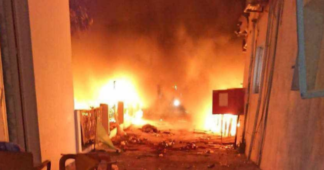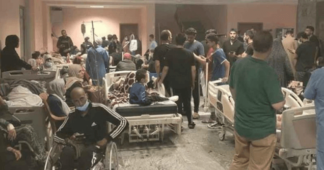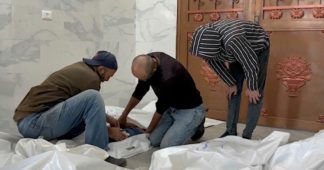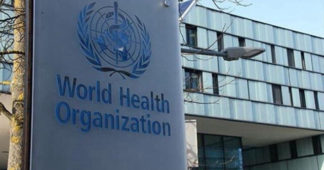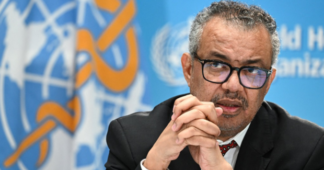Troops beat Hussam Abu Safiya and kidnapped him alongside other doctors, leaving northern Gaza without any health services
Dec 28, 2024
Israeli forces detained the director of Kamal Adwan Hospital, Dr Hussam Abu Safiya, after setting the health facility in northern Gaza on fire with doctors and patients inside, according to health officials.
The hospital was stormed by Israeli troops on Friday, following nearly three months of a suffocating blockade and constant air strikes on its departments and their vicinity.
The bombing caused several departments to catch fire, killing and wounding Palestinian medical workers and patients, according to Munir al-Bursh, director general of the Palestinian Health Ministry in Gaza.
All remaining medical staff, patients and their relatives were taken out of the hospital at gunpoint, forced to strip down to their underwear and transferred to an unknown location.
At the time of the raid, there were 350 people in the hospital, including 180 medical workers and 75 wounded people, according to the Gaza-based Government Media Office.
The Palestinian Health Ministry said dozens of doctors were taken to detention centres for interrogation.
On Saturday, it confirmed that Abu Safiya had been arrested.
Israeli forces violently beat him before his arrest, Bursh told Al Jazeera.
Over the past three months, Abu Safiya, a paediatrician, has published dozens of videos and sent out pleas to the international community to act against the Israeli attacks on Kamal Adwan Hospital.
He repeatedly warned that the lives of patients and medical staff were in danger amid constant Israeli bombings and a siege preventing the entry of aid and food.
“Instead of receiving aid, we receive tanks… which are shelling the [hospital] building,” said Abu Safiya in a video two months ago.
In late October, Abu Safiya’s son died as a result of an earlier Israeli raid on the hospital, according to health officials.
A month later, he was wounded in an Israeli air strike on the hospital complex.
Patients face death
Meanwhile, the fate of other medical staff and civilians kidnapped by Israeli forces from the hospital on Saturday remains unknown.
Bursh said the Ministry of Health had lost contact with 10 of its medical staff members.
Dr Rawia Tamboura told Middle East Eye that some medical workers were released and awaiting evacuation to Gaza City.
The Palestinian Health Ministry said some of the patients, including those in critical condition, were forcibly displaced to the war-battered Indonesian Hospital, which has been out of service due to Israeli attacks.
The patients faced a “harsh night” and remained in a “dire and extremely difficult situation”, the ministry said.
“With no water, no electricity, no blankets, no food, and no supplies, the countdown has begun for the loss of their lives,” it added.
Their lives were at immediate risk, especially since most medical staff were prevented from joining the patients at the Indonesian Hospital.
“We urgently call on all concerned institutions and parties to find a solution for the patients and injured currently at the Indonesian Hospital,” the ministry said in a statement.
The assault on Kamal Adwan Hospital came a day after 50 Palestinians were killed in an air strike on a building in the hospital’s grounds. At least five medical staff were killed in Thursday’s attack, along with their wives, parents and children.
The raid has left northern Gaza without any functioning healthcare centres.
Since Israel intensified its blockade on northern Gaza in October, Kamal Adwan Hospital has been operating at minimal capacity, offering life-saving services to newborn infants in neonatal intensive care units and other patients in ICUs.
The other two hospitals in the area, the Indonesian Hospital and al-Awda Hospital, ceased operations weeks ago due to ongoing Israeli attacks.
The Israeli offensive in northern Gaza, launched on 5 October, followed the presentation of a controversial proposal named the “Generals’ Plan” to the Israeli government.
The plan calls for ethnically cleansing areas north of the Netzarim Corridor, which divides Gaza in two, so Israel could establish a “closed military zone”.
According to the plan, anyone who chose to stay would be considered a Hamas operative and could be killed.
“The occupation is delivering the final blow to the remaining healthcare system in northern Gaza today,” the health ministry said on Friday following the raid on Kamal Adwan Hospital.
“This aligns perfectly with the generals’ plan to eliminate the population in the northern Gaza Strip.”
Deliberate destruction of Gaza’s health system
Since the assault on north Gaza was launched, Israeli forces have been accused of exacerbating starvation and malnutrition to ethnically cleanse Palestinians.
Oxfam reported earlier this month that only 12 aid trucks had made it into northern Gaza this month.
The Israeli military has also been accused of deliberately destroying Gaza’s health system through constant attacks on hospitals, ambulances and doctors since the 7 October Hamas-led attack on southern Israel.
Israeli forces previously raided the Strip’s two largest hospitals, the al-Shifa Hospital in Gaza City and Naser Hospital in Khan Younis, destroying them in the process.
They have also killed more than 1,150 health workers and detained 300 since the war on Gaza began, according to the Palestinian health ministry.
Last month, the International Criminal Court issued arrest warrants for Israeli Prime Minister Benjamin Netanyahu and former Defence Minister Yoav Gallant for war crimes and crimes against humanity in Gaza.
Israel also faces a genocide case at the International Court of Justice for its war on the enclave.
Additional reporting by Ahmed Dremly in Gaza City
We remind our readers that publication of articles on our site does not mean that we agree with what is written. Our policy is to publish anything which we consider of interest, so as to assist our readers in forming their opinions. Sometimes we even publish articles with which we totally disagree, since we believe it is important for our readers to be informed on as wide a spectrum of views as possible.

